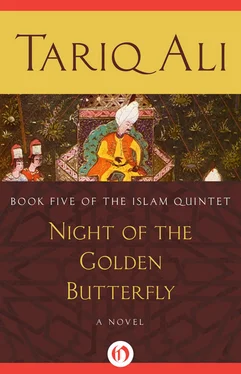Hanif picked us up at Beijing airport and drove us home, pointing at new buildings and naming their architects. He lives in a huge, comfortable apartment built about five or six years ago, close to the financial quarter. His wife, Cheng Yu-chih, is in her late forties, short hair, very well dressed and fluent in English and German. She works as an economist in some government department.
While he showed Zahid the apartment and then took him to the basement to inspect the health centre and swimming pool, I told Yu-chih our story. She was not as surprised as I thought she’d be. Hanif had told her that we were friends he had met in Paris, but that we might be related to him as well. Yu-chih explained that he was slowly trying to build a narrative of his life before his collapse, and since his return from Paris had told a number of people that he had been born in Lahore and had recently met his sister.
She also said he talked in his sleep in strange languages and occasionally used such archaic words in Chinese that she had to consult a dictionary. Now this began to make sense to her. She’d wondered who the old couple were that he had introduced her to once as his parents but who never came here and whom he rarely visited. Yu-chih had thought that he was ashamed of them because they were retired factory workers. This was a common phenomenon in all the big cities, so she had not questioned him too much on the subject. ‘When a country has changed its identity so completely, is it surprising that many of its citizens do the same?’
I like her very much. She is honest and intelligent.
When the two men returned, I said ‘Hanif, I really like your wife.’ The name startled him.
Then Zahid repeated it and he turned on us. ‘Why do you call me by that name? In Paris one of your friends called me Confucius, and now you call me, what did you call me?’
‘Hanif!’
‘It’s not a Chinese name.’
I nodded, but did not push him any further. Later Yu-chih asked me whether our family was Hui. I told her we were Hui from Yunnan, but when we settled in India some of our community took traditional Arab names from our ancestors as well. My parents and I had Chinese names, but they decided to call my brother Hanif. She sat down on the bed with her head in her hands.
‘Dear sister, Jindié, the reason I asked is because your brother is always cursing the Hui in Beijing, sometimes using very bad language. I always reprimand him, but even his body language becomes aggressive. He will never accept he is Hui. That will be the biggest shock for him. I haven’t dared tell him that my family in Shanghai are Hui. We are not religious at all, but my father, a surgeon, is proud of his heritage. Sometimes I take him to Oxen Street because it has the best noodles in town. It’s in the Hui area and he always looks at them strangely. Once he asked offensively for pork and got an offensive reply in return. “Go and fuck a pig,” he said before I drove the car away. I did shout at him afterwards. He talked more rubbish. “The first Hui who came to our country said they would return to theirs. They’re still here twelve centuries later. They should go home.” I asked whether all the minorities should return and reminded him that the Tibetans are desperate to do so but we won’t let them. His reply was very strange. He said: “The others can all stay. Only the Hui. They should go.” He doesn’t mind the Muslims in Xinjiang. They can stay as well. Just the Hui in the south. The intermarriages in the south between Hui and Han were so strong that for centuries the only distinguishing feature was the pork taboo and prayers.
‘Many Han thought Mohammad was just like Confucius for the Hui. Perhaps my dear husband hates hybridity. I just don’t know. None of our friends talks the way he does.’
All this came as a shock and I was very distressed. Slowly, I unpacked my suitcases, thinking all the time of how to unpack Hanif’s mind. I had brought a lovely old photograph of our parents and Younger and Elder Granny posing in front of the Zam Zam gun, which used to hang above the mantelpiece in our Lahore apartment. I now hung it on the wall in the living room. Then I placed a photograph of all of us just after my wedding, with Hanif dressed in an achkan , wearing a turban and grinning, in the kitchen. Yu-chih nearly fainted when she saw that one, but said nothing.
Zahid knew some Chinese physicians from international conferences and through them we found an excellent neurologist. I told her everything, including the outbreak of Hui-phobia. Dr Wang agreed to see him, but only after a month. She thought that with proper stimuli his memory could return. If the Punjabi language had been unlocked, then anything was possible. She wanted to know if there had been an accident, and said I should go and meet the couple he thought were his parents. All she would do was put him under a scanner to see if there had been any physical damage. The rest was up to us.
Hanif and Yu-chih would both leave for work early, and Zahid had gone to Isloo to take Neelam and the kids to London for their holidays. I was left on my own and went out to explore the city. Oxen Street was packed with people. I walked to the mosque and looked inside. Nobody cared. I found the best noodle stand in Beijing. It was marked qing zhen (halal); another sign said ‘no pork’. They were very good noodles. When I told the owner, who was all of twenty-five years old, that I was a Hui from Fatherland, he was very welcoming. Wanted to know how I had landed up there. His uncle, a Chinese naval engineer, was currently in Gwadur. Had I been there? I shook my head. He told me he was a secular Marxist but also Hui and observed minority holidays to honour his Arab ancestors. He said that since Gulf money has been coming in to help repair the mosques and build a few new ones, he had noticed an increase in mosque attendance. He winked. ‘I think some go for free food and clothes.’
Yu-chih took a day off work and drove me to an old part of the city to meet the couple Hanif thought were his parents. They live in a cluster of small houses near the outskirts of precapitalist Beijing. They must be in their late eighties. They welcomed us warmly and offered some tea and very sweet biscuits. They told their story openly; there was no subterfuge at all.
Hanif had been a very close friend of their son’s, and the boys often stayed with them in the late Sixties. The boys were members of a group of Red Guards that called itself From the Periphery to the Centre Proletarian Group for World Revolution. One day there was a clash, either with another group or with the Lin Biaoists in their own group. They could never get the details, but it ended with their son, Hsuan, being killed. Hanif picked up his friend and carried his body home. His own head was bleeding and he fell unconscious. The old couple began to weep at the memory of Hsuan, and both Yu-chih and I hugged and stroked them till they grew calm again. He had been their only child.
They had called an ambulance and Hanif was taken to the hospital, where he recovered consciousness but had no idea what had happened. He was sent back to their home in an ambulance. After the political turbulence had subsided he entered Beijing University, gaining admittance as the son of a working-class couple. The university authorities themselves were recovering from the chaos of that period. They were aware that Hanif had suffered a severe memory lapse and didn’t press him on details of his prior schooling or anything else. He was given new papers in his Cultural Revolution name, Chiao-fu. He was a brilliant student, always coming home with good reports. Then he went to Shanghai and Hong Kong to work and only recently had he returned to Beijing. Once he started working he had sent his ‘parents’ money every month, often accompanied by clothes and expensive food parcels. He never talked much after Hsuan’s death, but was always dutiful. It was Hanif who had assumed they really were his parents. They never corrected him because in a way he had become their son. Once he saw a photograph of Hsuan and himself with red bands on their heads and asked them, ‘Is that my brother? What happened to him? Why did he die?’
Читать дальше












